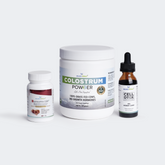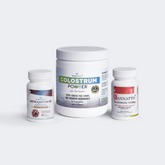Guide to Safe and Effective Body Detox to Lose Weight
Estimated Reading Time: 6 minutes
|These days, detox diets are everywhere, especially if you’re looking for a quick energy boost or a slimmer waistline. It sounds tempting, right? A short cleanse to “flush out the bad stuff” and feel brand new. But here’s the thing: your body already has a detox system. And the real question isn’t whether you need to detox, but how you can support what your body’s already doing naturally.
This guide walks you through a realistic, no gimmick way to feel better from the inside out using everyday foods and habits that actually work with your body.
Your Body’s Natural Detox System
Before doing any kind of detox, it helps to know this: the body already has systems in place to clear out what it doesn’t need. These systems are active all the time, not just during a cleanse.
-
Liver does most of the cleanup work. It takes things that the body doesn’t need and breaks them down so they can be cleared out.
-
Kidneys act like filters, pulling waste from blood and passing it out through urine.
-
Lungs handle what comes in through air, pushing out particles with each breath.
-
Digestive system moves food through, absorbs what’s useful, and keeps everything balanced.
-
Skin helps too, letting small amounts of waste out through sweat.
A solid detox doesn’t try to force these systems, it works with them. Staying hydrated, eating real food, and sticking to simple daily habits can make a big difference in how well the body does what it’s already built to do.
Do Detox Diets Actually Help with Weight Loss?
Some weight might come off in the beginning, but it’s mostly water and fewer calories, not fat. Once eating goes back to normal, the weight usually does too.
A review in the Journal of Human Nutrition and Dietetics looked at detox diets. It didn’t find strong proof they help with long term weight loss or toxin removal. Most studies were small. Few had proper control groups. Most relied on how people felt, not hard health data.
There are real downsides too.
-
Most detox plans cut calories too low and miss essential nutrients
-
People often feel tired, low energy, sometimes even lightheaded or weak
-
Some studies link these diets to higher cortisol, a hormone tied to cravings and fat storage
Instead of cutting too much, a better option is eating real food, meals that keep you steady. Mediterranean style eating, with vegetables, olive oil, grains, fish. It’s been studied more and actually holds up. Quick fixes don’t last. What works is showing up for your body every day in small ways that don’t fight it.
Also Read: How Cellular Detoxification Really Works
What to Eat While Detoxing
Eating certain foods during a detox can help the body work the way it’s supposed to. These support the liver, digestion, and overall balance.
-
Leafy greens like spinach and kale are full of fiber and antioxidants. They support digestion and liver function.
-
Cruciferous vegetables like broccoli, cauliflower, and Brussels sprouts have compounds that may help activate liver enzymes.
-
Berries such as blueberries and strawberries are rich in vitamin C and polyphenols. They help protect the liver from stress.
-
Beets are high in fiber and antioxidants. They may support liver activity and natural cleansing.
-
Citrus fruits like lemons and grapefruit offer vitamin C and antioxidants that help with detox.
-
Ginger and turmeric have been used for digestion and inflammation. Ginger may help the stomach empty faster. Turmeric has curcumin, which may support the liver.
-
Filtered water helps flush out waste through the kidneys and keeps the body hydrated.
-
Fruit and vegetable cleanses can boost intake of vitamins, minerals, and antioxidants. They may support gut health and improve how you feel.
Dietary Approaches with Scientific Support
Some eating patterns have been studied for their effect on weight and metabolism. These are a few with solid research behind them.
-
Mediterranean diet: This diet includes fruits, vegetables, whole grains, lean protein, and healthy fats like olive oil. It’s been shown to support healthy weight and may help reduce inflammation.
One study published in Nutrients found that people who followed a Mediterranean - style diet saw changes in waist measurements, blood pressure, and cholesterol levels.
-
DASH diet: This approach lowers salt and focuses on real food - vegetables, fruits, whole grains, and lean protein. Some research suggests it can help with weight and may support the heart. A meta analysis in Obesity Reviews found that people who followed the DASH diet lost more weight and had a lower BMI than those who didn’t.
-
Plant based diets: These focus on plant foods and reduce or remove animal products. They are often high in fiber, vitamins, and minerals.
A study in Nutrients showed that two weeks on a plant - based diet helped improve insulin resistance in people who were overweight.
Bringing any of these into your routine may help support long term weight and metabolic health.
Risks of Extreme Detox Diets
-
Missing nutrients: When detox plans are too strict, they often leave out basics like protein, vitamins, and minerals, which can lead to low energy, electrolyte imbalances, and a slowdown in how the body works. Some intense juice cleanses have even been linked to kidney problems.
-
Stress and cravings: Very low - calorie diets can raise cortisol, the body’s main stress hormone. This can lead to stronger cravings, a low mood, and a harder time staying consistent with food. Over time, it may also change how you think about eating, making healthy habits harder to keep.
A gentler approach works better. Eat food that nourishes. Keep things steady. Avoid anything that pushes too hard. The changes that last come from balance, not extremes.
Lifestyle Modifications
Eating well matters, but what you do each day plays a role too. Simple habits can help the body do what it’s already built to do.
Move your body
Aim for around 150 minutes of movement each week. This doesn’t need to be complicated. Walk, stretch, ride a bike - anything that gets blood flowing and helps the body release waste through sweat.
Sleep well
Rest matters more than most people think. Sleep helps keep hormones steady and gives the body time to recover. Without enough of it, energy drops and things stop working the way they should.
Find ways to ease stress
Ongoing stress can get in the way of digestion, energy, and how your body handles food. You don’t need a full routine - just something that helps. Maybe it’s a quiet walk, deep breathing, or five minutes of stillness. Keep it simple, and do it often.
Keep It Simple, Let the Body Lead
Detox is not about doing something extreme. It is a chance to step back, clear the noise, and give the body what it needs. Lasting change does not come from shortcuts. It comes from showing up daily - eating real food, resting when you need to, and building habits that hold up over time. The body already knows how to detox. Your job is to support it. You don’t have to do everything at once. Just start where you are. The body responds when you give it the basics.
Disclaimer: This content is for informational purposes only and is not intended to diagnose, treat, cure, or prevent any disease. Always consult your healthcare provider before making changes to your diet or wellness routine.
References
-
Klein AV, Kiat H. Detox diets for toxin elimination and weight management: a critical review of the evidence. Journal of Human Nutrition and Dietetics. 2014;28(6):675 - 686. doi:https://doi.org/10.1111/jhn.12286
-
Dayi T, Ozgoren M. Effects of the Mediterranean diet on the components of metabolic syndrome. Journal of preventive medicine and hygiene. 2022;63(2 Suppl 3):E56 - E64. doi:https://doi.org/10.15167/2421 - 4248/jpmh2022.63.2S3.2747
-
Soltani S, Shirani F, Chitsazi MJ, Salehi - Abargouei A. The effect of dietary approaches to stop hypertension (DASH) diet on weight and body composition in adults: a systematic review and meta - analysis of randomized controlled clinical trials. Obesity Reviews. 2016;17(5):442 - 454. doi:https://doi.org/10.1111/obr.12391
-
Anne - Ditte Termannsen, Søndergaard CS, Færch K, Andersen TH, Raben A, Quist JS. Effects of Plant - Based Diets on Markers of Insulin Sensitivity: A Systematic Review and Meta - Analysis of Randomised Controlled Trials. Nutrients. 2024;16(13):2110 - 2110. doi:https://doi.org/10.3390/nu16132110
HYPERLINK "https://pmc.ncbi.nlm.nih.gov/articles/PMC9710414/"







































